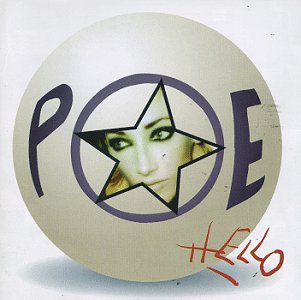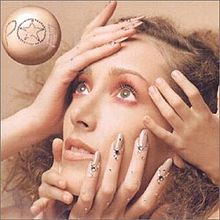An Analysis of House of Leaves Part II: Poe's "Haunted"
- 5 minutes read - 995 wordsIntroduction
In the previous post I explained that my interpretation of House of Leaves was based on the honest, first-person perspective performed by Poe in her album “Haunted.” Her story of struggling to be heard against the voice and pursuits of her father (his Houses of Leaves) is a dominant theme in this work. In this post I’d like to describe how I became so thoroughly familiar with this recording.
In 2000 late I was in Campbell, CA on a rainy (yes, California had rain back then), winter afternoon. I had been in the Bay Area for about 4 months and still hadn’t met many people. To pass the time I would often go music shopping at the Rasputin records and grab a set of tacos from Taco Bravo. On one occasion I saw that a musician whose music I had enjoyed in 1996, and whom I had even seen perform in Houston in that same year, Poe, had released a new record, “Haunted.”
Poe
Hello

I had enjoyed the artist’s previous release, 1995’s “Hello.” The work cuts an uneven path through dreamy trip-hop, a poppy PJ Harvey, and personal demon exorcism. I’m sure some A&R agent figured this was a dreamier, trip-hoppier Alanis Morrissette. I listened to the disc several times and distinctly recall the title track and its caustic line: “Fathers are black holes that suck up the light.” This reflective, hurt, vulnerable voice in the album seemed to be the artist’s strongest register especially in the songs “Hello”, “That Day,” and “Beautiful Girl.” They seemed to hint at something that might unfurl interestingly in a sophomore effort and here it was.
Haunted

I picked up the disc and struck by the sonic maturity that had come in. While “Hello” had felt like a trip-hop, Portishead-infused hodgepodge of songs, “Haunted” was a work complete, and large, with a message, a story that each of its songs, in aggregate compounded. Best of all it was in that third voice of “Hello:” the personal, the transcendent, the dreamlike, the vulnerable.
Many of the songs described the complicated relationship of a girl with her father. In many interludes and overlays there are bits of old scratchy dialog between a stentorian voice and a little girl. He’s by turns loving and patient but also pedantic and aloof in their snippets. Many times it feels like he’s “performing” for the recording and isn’t entirely there with the daughter.
Through the course of the story we come to understand the true nature of their relationship: one of love, but also one of distance and how, wedged between those two poles, the daughter, now an adult, is reconciling herself to what those memories mean now that the father has died.
It’s complex, it’s wrenching and utterly real. Actually, that’s where the fascination deepens from the realm of art (“Haunted”) into reality. It is utterly real because the dialogs are the dialogs between the artist Poe, a.k.a. Annie Decatur Danielewski and her father, lecturer and filmmaker, Tad Danielewski.
She says on the first page of the liner notes of the CD [1]:
A few years after my father died my brother and I came across a box of cassettes-recordings of my fathers’ voice. One was a letter to my brother that he had spoken into a tape recorder long ago: another was the recording of a speech he had given during his years as a teacher; and a few more contained random recordings of forgotten family noise. Hearing his voice again shook me to my foundation. At first I couldn’t bear to listen to him, then I couldn’t stop…I entered into a dialogue with that ghost.
It’s notable that Annie calls out that both she and her brother shared this resurrection of the ghost of their father. From this resurrection Poe’s song House of Leaves and her brother’s novel by the same title emerged. What is the link? The lyrics guide us into understanding what the House of Leaves means.
“House of Leaves” lyrics:
Spanish schoolteacher: WELL, NOW AFTER ALL THAT
THINKING, WOULDN'T IT BE FINE IF
WE COULD TAKE A LITTLE TRIP? WE WILL DO IT. I
KNOW A GAME WE ALL LIKE TO PLAY
INSIDE LA CASA--THE HOUSE. WE WILL PLAY HIDE AND
SEEK.
Daughter:
I can hear myself; I'm somewhere in there....What's
happening? DADDY?
Mother:
Nobody's home...NOBODY'S HOME....
Father:
I thought he was dead
Daughter:
Where are you?
Father:
Dead.
[DAUGHTER CRYING.]
{Father: (soft) I WASN'T SURE IF I'M GOING
TO SURVIVE THIS HORROR....}
Brother: NO ONE SHOULD (fading) BRAVE THE
UNDERWORLD ALONE.
French song ("DOMINIQUE"):
Mother and Father:
Dominique, nique, nique
S'en allait tout simplement
Routier pauvre et chantant
En tous chemins, en tous lieux
Il ne parle que du bon Dieu
Il ne parle que du bon Dieu
Father:
Try now to take the next step.
[RING.]
Father:
You sing very well Annie.
[RING.]
Mother:
Hello? HELLO?
Daughter:
MOM?
My interpretation is that the song House of Leaves is a sonic representation of a state of confusion in which four confused people call out for each other, but fail to connect inside the orbit of the House (of Leaves). Daughter calls for her parents and parents realize they can’t find each other or the children. Father also has a sense that he is lost inside of something that he may not get out of. Brother, quoting a line from Poe’s song “Hello” suggests that he and Daughter, Poe, have each other in braving the House’s underworld, while they were being ignored.
This was the back-story I brought to the novel House of Leaves when I finally decided to read it I went looking in Mark’s book for the story Annie had shared.
In my next post I’ll explore how Poe’s story is revealed in the book House of Leaves.
Footnotes
- In Johnny Truant style, I fished these liner notes out of the CD case when I came across it while cleaning out my storage unit in